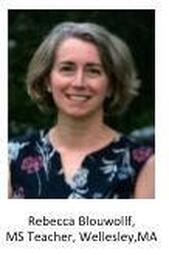 How do we set up student for success in today’s distance learning environment? To answer this question, we invited Rebecca Blouwolff, a master teacher and recipient of the 2020 National Teacher of the Year award from the American Council on the Teaching of Foreign Languages (ACTFL), and a group of seven outstanding teachers representing the richness of languages and cultures served by the PDRC. Using the ACTFL guidelines for the Interpretive and Interpersonal Modes of Communication, the team introduced and discussed a set of learned-centered strategies that empower and motivate students to further develop their Heritage language and culture, and/or acquire a new World language. Among other, the group discussed the value of using authentic materials, such as traditional songs, videos, films and projects that together with carefully chosen strategies, enable differentiation and immerse students in a full range of cultural topics while teaching vocabulary in real-life contexts. Meet these outstanding teachers:  Wei Guo He teaches Mandarin at Riverdale County School, in the Bronx, NY. His approach centers on the active use of the language. At the present time, most of his students learn Mandarin Chinese as a World Language and that is the focus of the curriculum. In the current virtual environment, he emphasizes the Interpersonal and Presentational modes. He uses short video clips to engage students in discussions, in pairs and small groups within the Google Classroom. He also uses Google Slides and other online programs to share authentic documents with his students. He also highlighted that he provides individualized support to Heritage language speakers by phone once or twice every other week. 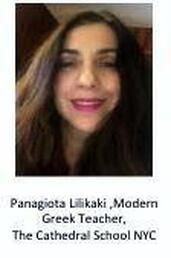 Panagiota Lilikaki She teaches Greek at the Cathedral School in New York City. “At the school, students learn both the Greek language and the Greek culture, starting in the early grades. Both are equally important to my students”, she says. She is also a firm proponent of authentic resources, including traditional music that she often uses as an introduction to learning the language. At Cathedral, there is a strong collaboration among departments, and she often brings projects from other content areas into the Greek language program, e.g. students used their knowledge of operations to create a calendar using the Greek language. 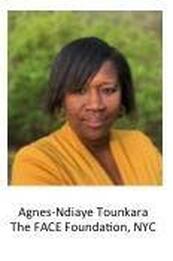 Agnes - Nidiaye Tounkara She works for the FACE (French American Cultural Exchange) Foundation in New York City. She serves mostly Heritage language students from Haiti and from Africa who study to maintain their language and culture. According to Ms. Tounkara, many of the students are fluent speakers but they only know the informal and social language. They are also fluent in English, and have the tendency to switch to English when their French language falters. She uses authentic texts with a strong cultural component to motivate and keep students actively involved while learning the academic language, and learn to communicate in more formal situations both verbally and in writing. 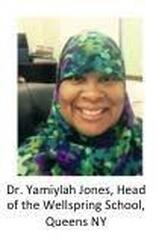 Dr. Yamiylah Jones She is the Principal of the Wellspring School in Queens, NY. In her school, students learn not only modern Arabic but also the Arabic of the Quran. They are distinct and equally important, she says, because learning the Heritage language is correlated with the values and morals of our culture. The teaching of the language in the classroom and now online, emphasizes students’ active interactions with the teacher and student to student, while promoting critical thinking on what is the meaning of the language through text-to-self, and text-to world reflections. 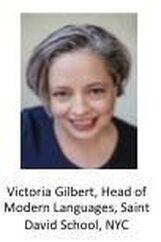 Victoria Gilbert She is the Head of Modern Languages at Saint David School in New York City. “We teach Spanish starting in the early grades”, she says. Our approach is to teach the language in ‘small drips’, that is about 15 minutes each day which amounts to 90-150 minutes a week. To bring authentic audience into the online classroom, I took video footage from the community and use it in my lessons. I also encourage my students and their parents to record conversation on the phone and send me the voice memos. My students learn to focus on the decision point –what we need to decide together, to encourage interpersonal communication. 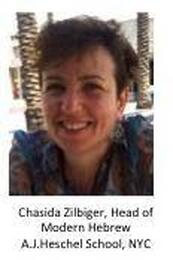 Chasida Zilbiger She is the Head of Modern Hebrew at the Abraham Joshua Heschel School in New York City. “We teach Hebrew to build knowledge in the language, the Israel culture and the ability to relate to people worldwide” she explains. Ms. Zilbiger continue, “I use authentic resources and seek to personalize instruction by having one-to-one conversation with each student over the phone because it helps them develop their interpersonal communication skills and their social emotional learning. ”She conI adapt my conversation based on their proficiency; it can be a discussion on an article or just an answer to an agree/disagree statement. I reach our to all my students every one or two weeks. 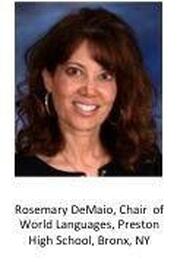 Rosemary DeMaio: She is the Chair of World Languages at Preston High School, in the Bronx, NY. In her school, the study of Italian is a very structured program and after 4 years, students can earn up to 11 language credits from the University of Albany. The use of authentic resources in the Italian class is closely linked to the teaching of Catholic values as well. For example, “Recently, my students listened to a song that spoke about mistreatment of people and we used it as a springboard to talk about the people who are suffering the most and are invisible to the society. During a zoom meeting, they created slogans to thank those who are helping those who suffer.” Join this team on Monday, June 8, 2020, from 2:30 pm to 3:30 pm and participate in this session: Going Virtual: Celebrating Who We Are while Expanding Students' World View through Intercultural Communication Registration Link: https://bit.ly/PDRCJune8
0 Comments
|
Archives
January 2024
Categories
All
|

